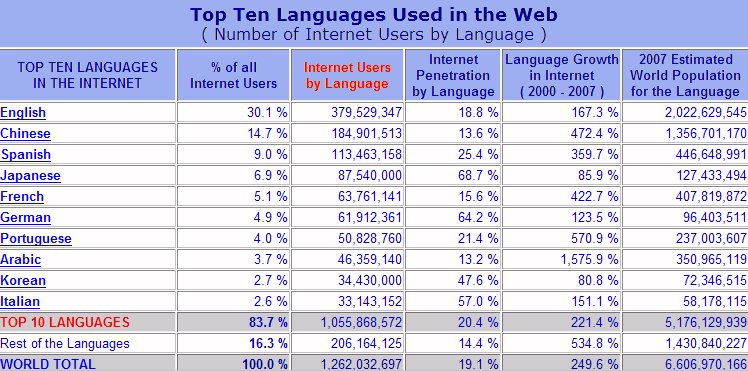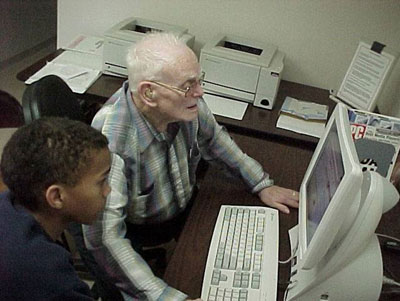|
|
|||||||||||||||||||||||||||||||
|
The Internet is Growing
World Statistics of Internet Growth By Charles Moffat - February 2008. Only 19.1% of the world has access to the internet and knows how to use it. That means there is a lot of potential for growth out there during the 21st century, but just how fast is it growing? Well, in English speaking countries only 18.8% of the population uses the internet. In Japan it is 68.7% and for German speakers it is 64.2%. So apparently English speakers are not using the internet as much as they could be. Other languages that are far ahead of English are Spanish (25.4%), Korean (47.6%) and Italian (57.0%). See the full stats at the bottom of this page. In North America approx. two thirds of the population has access to the internet at either work or home. So in some countries the internet (and computer use in general) is really popular but in North America/Britain we have barely even begun. Why is this?
Part of the problem is a generational gap. Some elderly people can't even handle the basics like email or typing. Some older people have never even sat at a computer and just typed. They are afraid they will break it somehow and aren't confident enough to just "play with it" (which is how the Nintendo generation has learned it so quickly). But this effects all countries, not just English countries. Another part is specific to North America, and it is best described as "anti nerdism". Both men and women seem to think that "computers and the internet is just for nerds" and think they themselves are not smart enough to figure it out. I would like to point out that this concept of a nerd doesn't translate into other languages so much. Many languages don't even have a word for nerd and the closest translation is "genius" or "smart person". The term "nerd" seems to be a product of North American popular culture (movies like "Revenge of the Nerds", etc.) and is really an unfair stereotype. A third aspect is wealth. Germany, Austria and Japan have very high standards of living and education and very low levels of unemployment. Most people in those countries can afford to buy a computer. In North America we have high rates of unemployment and high rates of debt. Most people can't afford a computer or internet access. The vast majority of North Americans have only high school or college diplomas and have never even learned how to use a computer.
These days computer use is standard in most schools in North America. Almost every classroom has at least 1 computer in it. We can only presume that in the future every student's desk will someday have a computer (presumably a laptop paid for by their parents). The $100 laptops that MIT is building to send to third-world countries, part of their "one laptop per child" program, is going well. The XO Laptop has yet to reach the target price. It is currently being sold to third world countries for $190 US and for $400 in North America, which sends the buyer one laptop and donates a 2nd laptop to a needy child. See LaptopGiving.org Which is funny when you consider that at least 30% of children in North America don't have access to a computer at home. A good chunk of America simply can't afford a computer for their kids, but it is getting easier. Intel now offers a Classmate PC that starts at under $300, Everex offers a PC at $300, Acer a $350 laptop, and last fall Asus debuted the Eee PC 701, a $400 laptop whose interface offers users only six basic categories (Internet, Work, Learn, Play, Settings and Favourites). So it is getting cheaper. These days you can also buy an used computer in excellent condition for about $150 to $300 (depending on how old and slow it is). So in theory we should eventually reach a point where everyone in North America has a new or used computer. But getting people started may be tricky. Some parents have had computers with internet in their homes for years or over a decade now which was primarily for their child's use. They have never bothered to even try it, or if they did they learned only the basics like email or how to print out their job resume. As the world's economy grows internet and computer technology will doubtlessly spread across the globe. So far internet penetration is a mere 19.1% so in the next 50 years or so the number of people online should quadruple as it becomes our primary source of entertainment (as opposed to television). The internet will be here, presumably, forever. It may change and become more image and video heavy, but text, mere words, will always be here. It will become easier/faster to use and it will evolve as big corporations like Yahoo and Google come and go, but text will remain the basis of everything we do. But one piece of technology out there will also radically change how we communicate internationally. Google has developed a free language translation website that "learns" and is constantly updating itself (I presume they have a team of translators who are constantly adding new, better translations to a smart database).
So in the future language will no longer be a barrier. We will be able to communicate with each other regardless. Google has taken some very important first steps towards building an universal translator and is constantly working to add more languages to the database. The future of the internet is looking very bright. Imagine for example making a blog in the future that is automatically! tranlated into all of the world's languages and available to everyone? Being able to sell a product, promote an idea or just be able talk to friends from France, Korea, Russia or Iran... without either of you knowing a word of the other's language. Sounds like a recipe for world peace. But there is one trick first. The world needs the wealth and humanity to spread all that technology across the globe and take the time to communicate with each other.

|
|
||||||||||||||||||||||||||||||
|
Website Design + SEO by designSEO.ca ~ Owned + Edited by Suzanne MacNevin | |||||||||||||||||||||||||||||||



